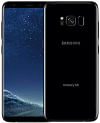Popular Products
Compare Samsung Galaxy S8 Vs OnePlus 7
Should you buy Samsung Galaxy S8 or OnePlus 7? Well, your search ends here. Find out which mobile phone is best for you - Compare the two models on the basis of their Price in India, Body, Display, Storage, Connectivity, Camera, and Performance. Samsung Galaxy S8 starts at ₹ 25,000 and OnePlus 7 starts at ₹ 16,449.
Samsung Galaxy S8 comes up with internal storage of 64 GB and RAM of 4 GB. OnePlus 7 comes up with internal storage of 256 GB and RAM of 8 GB .
Check detailed comparison below to compare specification for both models. Don't forget to check out expert opinion as well.
Samsung Galaxy S8 Vs OnePlus 7
| Specifications | Samsung Galaxy S8 | OnePlus 7 |
|---|---|---|
| OS | Android 7.0 (Nougat), upgradable to Android 9.0 (Pie); One UI | |
| Screen Size | 5.8 inches, 84.8 cm (83.6% screen-to-body ratio) | |
| Chipset | Qualcomm MSM8998 Snapdragon 835 (10 nm) | Qualcomm SDM855 Snapdragon 855 (7 nm) |
| RAM | 4 GB | 12 GB |
| Internal Storage | 64 GB |
Compare Models
Summary | |||
| Specs Score | 71 | 78 | |
| OS | Android 7.0 (Nougat), upgradable to Android 9.0 (Pie); One UI | ||
| Screen Size | 5.8 inches, 84.8 cm (83.6% screen-to-body ratio) | ||
| Chipset | Qualcomm MSM8998 Snapdragon 835 (10 nm) | Qualcomm SDM855 Snapdragon 855 (7 nm) | |
| RAM | 4 GB | 12 GB | |
| Internal Storage | 64 GB | ||
GENERAL | |||
| Colours | Midnight Black, Orchid Gray, Arctic Silver, Coral Blue, Maple Gold, Rose Pink, Burgundy Red | Mirror Gray, Red, Mirror Blue | |
| Operating System | Android 7.0 (Nougat), upgradable to Android 9.0 (Pie); One UI | ||
| Sim | Hybrid Dual SIM (Nano-SIM, dual stand-by) | Dual SIM | |
Similiar Alternatives
- Samsung Galaxy S8
- OnePlus 7
DESIGN | |||
| Body Material | Front/back glass (Gorilla Glass 5), aluminum frame | Mirror Gray, Red, Mirror Blue | |
| Weight | 155 grams | 182 g | |
DISPLAY | |||
| Display Protection | Corning Gorilla Glass 5 | Corning Gorilla Glass | |
| Pixel Density | 294ppi density | ||
| Screen resolution | 1440 x 2960 pixels, 18.5:9 ratio | ||
| Screen size | 5.8 inches, 84.8 cm (83.6% screen-to-body ratio) | ||
| Technology | Super AMOLED capacitive touchscreen, 16M colors | ||
PERFORMANCE | |||
| Chipset | Qualcomm MSM8998 Snapdragon 835 (10 nm) | Qualcomm SDM855 Snapdragon 855 (7 nm) | |
| CPU | Octa-core (4x2.35 GHz Kryo & 4x1.9 GHz Kryo) | Octa-core (1x2.84 GHz Kryo 485 & 3x2.42 GHz Kryo 485 & 4x1.80 GHz Kryo 485) | |
| GPU | Adreno 540 | Adreno 640 | |
| RAM | 4 GB | 12 GB | |
STORAGE | |||
| Card Slot | microSD, up to 256 GB (uses SIM 2 slot) | No | |
| Internal Storage | 64 GB | ||
CAMERA | |||
| Camera Features | LED flash, auto-HDR, panorama | Dual-LED dual-tone flash, panorama, HDR | |
| Front Camera | 8 MP (f/1.7 | 16 MP (f/2.0, 25mm wide) | |
| Primary camera | 12 MP | ||
BATTERY | |||
| Capacity | 3000 mAh | Optic AMOLED, HDR10 | |
| Stand By | Upto 200 hours | ||
| Talk Time | Upto 20 hours (3G) | ||
CONNECTIVITY | |||
| Bluetooth | Yes, 5.0, A2DP, LE, aptX | ||
| Edge | Yes | Yes | |
| GPRS | Yes | Yes | |
| GPS Facility | Yes, with A-GPS, GLONASS, BDS, GALILEO | Yes, with dual-band A-GPS, GLONASS, BDS, GALILEO, SBAS | |
| Speed | HSPA 42.2/5.76 Mbps, LTE-A (5CA) Cat16 1024/150 Mbps | HSPA 42.2/5.76 Mbps, LTE-A (5CA) Cat18 1200/150 Mbps | |
| USB | 3.1, Type-C 1.0 reversible connector | USB Type-C 3.1, USB On-The-Go | |
NETWORK SUPPORT | |||
| 2G | Yes | Yes | |
| 3G | HSDPA 850 / 900 / 1700(AWS) / 1900 / 2100 | Yes | |
| 4G | Yes | Yes | |
| 5G | Yes | Yes | |
MORE FEATURES | |||
| Other Features | IP68 dust/water proof (up to 1.5m for 30 mins) | Face Unlock, Quick Charging, NFC | |
| Quick Charging | Fast battery charging 15W (Quick Charge 2.0) | Fast battery charging, 20W | |
| Sensors | Iris scanner, fingerprint (rear-mounted), accelerometer, gyro, proximity, compass, barometer, heart rate, SpO2 | Fingerprint (under display, optical), accelerometer, gyro, proximity, compass | |
Similiar Comparisions
- Samsung Galaxy S8
- OnePlus 7
Popular Mobile
- Under 10K
- 10-20K
- 20-40K
- Above 40K
Detailed Comparison of Samsung Galaxy S8 vs OnePlus 7
Performance Comparison: Samsung Galaxy S8 vs OnePlus 7
Chipset, one of the important feature of the mobiles used in these Mobiles are Qualcomm MSM8998 Snapdragon 835 (10 nm) and Qualcomm SDM855 Snapdragon 855 (7 nm) respectively. Samsung Galaxy S8 comes up microSD, up to 256 GB (uses SIM 2 slot) card slot and OnePlus 7 comes up with No card slot. CPU used in Samsung Galaxy S8 is Octa-core (4x2.35 GHz Kryo & 4x1.9 GHz Kryo) and used in OnePlus 7 is Octa-core (1x2.84 GHz Kryo 485 & 3x2.42 GHz Kryo 485 & 4x1.80 GHz Kryo 485).
